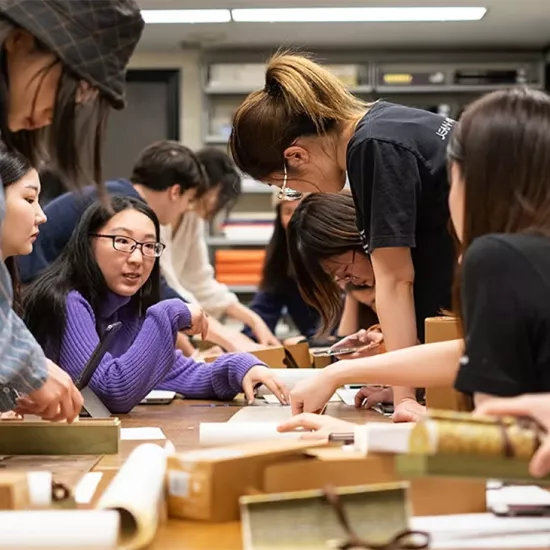New funding opportunity established at UTM supports Black, Indigenous, and racialized research

Indigenous science and technology scholar Kristen Bos is spearheading a three-part visual series that contextualizes pollution in Ontario’s oil and gas extraction sector.

An assistant professor in UTM’s Department of Historical Studies, Bos is leading the Visualizing Cumulative Pollution project, which is part of the Indigenous-led Environmental Data Justice (EDJ) Lab housed at U of T's Technoscience Research Unit (TRU), where Bos is the co-director. Previous research outputs from the EDJ Lab include the Pollution Reporter App, which shares information that connects polluters to their pollution and research on known health harms, and allows users to report a pollution event, spill, or leak to the Ontario Ministry of Environment, making it easier for community members to report problems to the Spill Action Centre.
“The TRU is a collective of researchers dedicated to supporting social justice-oriented science and technology studies, and involves collaborations between faculty, graduate students and community researchers with strengths in Indigenous and feminist (science and technology studies), data justice and environmental justice,” says Bos.
“Our Visualizing Cumulative Pollution project focuses on cumulative pollution, which is a pertinent issue in industrial hubs, where Black, Indigenous, and mostly racialized and/or poor communities are exposed to multiple toxicants simultaneously and intergenerationally,” she continues. “Each visual that will come out of this project seeks to create accessible representations of complex data, both visually and informationally.”
Bos says her team will create an interactive visualization and the data via infographics.
The research team includes TRU's other co-director, Michelly Murphy, Canada Research Chair in science and technology studies and environmental data justice and a professor in History and Women and Gender Studies at U of T; Vanessa Gray, a community researcher from Aamjiwnaang First Nation and co-lead at the EDJ lab, and co-founder of the grassroots organization Aamjiwnaang and Sarnia Against Pipelines (ASAP); and Reena Shadaan, who is a PhD candidate at the Faculty of Environmental and Urban Change at York University and co-lead on the Pollution Reporter App.
Other UTM researchers who received Black, Indigenous, and Racialized Scholar/Research Grants are:
- Randy Besco, Political Science, Racism in Canadian politics and public opinion
- Joanne Chung, Psychology, Investigating personality development during the college years in a sample of racialized young adults at the University of Toronto Mississauga;
- Martha Balaguero Cuervo, Political Science, Transing epistemologies: trauma informed research with gender-variant participants
- Negin Dahya, Institute of Communication, Culture, Information, and Technology, The (re)formation of race in refugee resettlement: Understanding race in forced migration, media, and technology
- Jerry Flores, Sociology, Broadening access to the Kaxúmbekua (way of life): Saving P’urhépechaculture across English speaking countries
- Tracey Galloway, Anthropology and Kathi Wilson, Geography, Racialized, immigrant and Indigenous community experiences of the COVID-19 pandemic in Peel Region
- Sonia Kang, Management, Naming and framing of minority group labels;
- Lisa Kramer, Management, Racism, economic decisions, and financial outcomes;
- Lauren Schroeder, Anthropology for her workshop Dialogues in Decolonization
- Weiguo Zhang, Sociology, COVID-19 Racism against Chinese in Canada.
“UTM established the Black, Indigenous, and Racialized Scholar/Research Grant Program in order to address the ongoing effects of racism and racial disparities in all aspects of society, including within academia,” says UTM’s Associate Vice-Principal, Research Elspeth Brown, professor in the Department of Historical Studies.
“We are aiming to support collaborative projects that address questions of racial inequity and social justice, as well as advance UTM’s commitment to the University’s response to the Truth and Reconciliation Commission of Canada, Answering the Call: Wecheehetowin. We are absolutely delighted by this first round and so impressed by the variety of projects that came forward from UTM researchers.”
Established this year, the program emerged through a collaboration of leaders from the Black Faculty Research Network; the Office of the Vice-Principal Academic and Dean; the Office of the Vice-Principal, Research; UTM’s Indigenous Centre; and UTM’s Equity, Diversity & Inclusion Office.
See the Office of the Vice-Principal, Research website for more details about this funding program.



